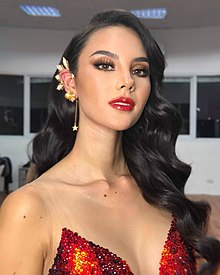User:Patrick Cristiano/Colonial mentality

| Part of a series on the |
| Culture of the Philippines |
|---|
 |
| Society |
| Arts and literature |
| Other |
| Symbols |
|
Philippines portal |
Colonial mentality refers to a modern trait of a society, specifically one with a history of colonization, in which such society views themselves as ethnically and culturally inferior to their colonizers as "a form of internalized oppression".[1] Colonial mentality is a common aspect of the Filipino culture, given the country's long history of colonialism. It has driven Filipinos to adapt to Western modernity and their system.[2]
Common examples[edit]
Use of English[edit]
English, an official language of the country aside from the native Filipino, is widely used in business, education, government, media, and everyday life, especially among the middle-upper and upper classes.[3] It has been spoken in the country since the American colonization, where English was used as the medium of instruction in the public education system.[4]
Popular culture[edit]
Filipinos today are heavily invested on Western pop cultural trends, which can be attributed to their exposure to American-style literature during the American colonization.[1][2]
Perception on beauty standards[edit]
Filipinos tend to have preference for Filipino mestizos, defined as mixed-race, in entertainment and mass media. Even if a majority of the population are Austronesian (having features like tan skin, dark hair, and flat nose), mestizos attract more media attention.[5] For example, at major beauty pageants, the Philippines has selected numerous mestizos to represent the country. In 2017, Filipina actress Asia Jackson published a viral video online, criticizing the concept of colorism and how Filipinos tend to have "anti-dark skin attitudes".[6]
The process of skin whitening is common in Filipino culture. Skin care products, such as soaps, cream, pills, and injectables, are often promoted in the country as means to obtain "fair" skin.[5][7]
In Filipino American households, common everyday behaviors of colonial mentality relating to skin or body features include parents telling their children "not to stay out [of the house] for too long 'or else [they will] get dark'" and "pinching babies' noses to make them appear sharper".[8]
Impact on mental health[edit]
Studies have shown that the effects of colonial mentality impacts mental health. Researchers on Filipino American psychology say that any negative comment on Filipino body features, such as dark skin, can cause low self-esteem. They added that the denigration of one's culture in forms such as believing that Western cuisine is "better than" Filipino cuisine or preferring to speak English over Filipino can cause depression.[8]
Reactions and responses[edit]
The creative industries in the Philippines are addressing colonial mentality by promoting and supporting the local arts. By doing so, they hope that Filipino audiences would gain better appreciation for homegrown talent. However, the industry notes that one of their challenges in decreasing colonial mentality is that their efforts only penetrate certain social classes.[9]
Vice President Leni Robredo noted that the issue of colonial mentality is a "centuries-old issue", dating back to the latter years of the Spanish colonization in the country.[6]
During the COVID-19 pandemic, netizens reacted to a statement by presidential spokesperson Harry Roque that "associates scrutiny of COVID-19 vaccine deals with colonial mentality". Many netizens called on the administration of President Rodrigo Duterte to consider vaccine producers with higher efficacy rates as factors in negotiating vaccine deals. Dr. Anthony Leachon, a dismissed member of the Inter-Agency Task Force for the Management of Emerging Infectious Diseases, said that vaccine choice is "all about safety and efficacy" and "nothing more", since "health is a basic right".[10]
Recovery[edit]
Leny Mendoza Strobel, a professor emeritus of Sonoma State University in Rohnert Park, California, recommended a "decolonization" process to eradicate colonial mentality on an individual basis; Strobel defined decolonization as "the process of humanizing the dehumanized by promoting positive mental health and identity for persons of colonized backgrounds". Some of the actions she recommended include learning about the colonial history of the Philippines, reflecting, storytelling or engaging in conversations, seeking a "culturally-responsive" therapist, engaging in social action, and practicing self-care.[8]
See also[edit]
References[edit]
- ^ a b Decena, Ashley M., "Identity, colonial mentality, and decolonizing the mind : exploring narratives and examining mental health implications for Filipino Americans" (2014). Masters Thesis, Smith College, Northampton, MA. https://scholarworks.smith.edu/theses/769
- ^ a b Eisen, D. B., Takasaki, K., & Tagayuna, A. (2015). Am I Really Filipino?: The Unintended Consequences of Filipino Language and Culture Courses in Hawai'i. View of Am I Really Filipino?: The unintended consequences of Filipino language and Culture courses in Hawai'i. https://journals.shareok.org/jcscore/article/view/17/14.
- ^ Brown, Michael Edward; Ganguly, Sumit (2003). Fighting Words: Language Policy and Ethnic Relations in Asia. MIT Press. pp. 323–325. ISBN 978-0-262-52333-2. Retrieved August 4, 2020.
- ^ Thompson, Roger M. (2003). Filipino English and Taglish: Language Switching from Multiple Perspectives. John Benjamins Publishing. pp. 27–29. ISBN 9789027248916.
- ^ a b Zapata, Karina (April 24, 2021). "Why some Filipinos lighten their skin, some don't, and few want to talk about it". CBC News. Retrieved August 2, 2021.
- ^ a b Leaño, A. (n.d.). Filipinos, colonial mentality, and mental Health: A psychological approach to exploring the effects of colonialism among Filipinos (psychologytoday.com). PACEsConnection. https://www.pacesconnection.com/blog/filipinos-colonial-mentality-and-mental-health-a-psychological-approach-to-exploring-the-effects-of-colonialism-among-filipinos-psychologytoday-com.
- ^ Wikimedia Foundation. (2021, July 21). Colonial mentality. Wikipedia. https://en.wikipedia.org/wiki/Colonial_mentality.
- ^ a b c Amhplify. (2020, October 22). Colonial mentality in the Filipino-/American Community. asianmentalhealthproject.com. https://asianmentalhealthproject.com/2020/10/22/colonial-mentality-in-the-filipino-american-community/.
- ^ Mateo, F. V. (n.d.). Challenging Filipino colonial mentality with Philippine Art. USF Scholarship: a digital repository @ Gleeson Library | Geschke Center. https://repository.usfca.edu/thes/196/.
- ^ Del Rosario, Denver (January 12, 2021). "'Never about colonial mentality': Netizens rip Roque for crass vaccine remark". Philippine Daily Inquirer. Retrieved August 3, 2021.
External links[edit]
- Colonial Mentality in the Filipino-American Community – Asian Mental Health Project

